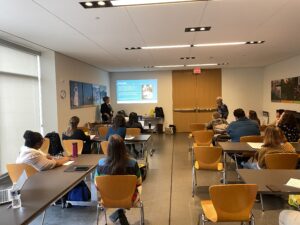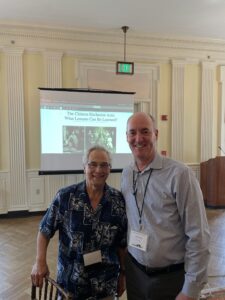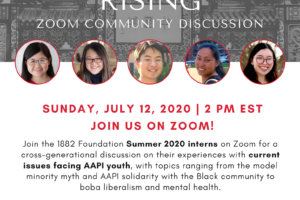On the Education front:
The Virginia Council for the Social Studies held its first conference since the pandemic started in Richmond on March 24-25. The shared campus of the Virginia Museum of Fine Arts and the Virginia Museum of History and Culture provided a beautiful setting for the event. 450 teachers attended workshops and heard keynote addresses by noted authors and scholars Kwame Alexander, Hasan Kwame Jeffries, and Anna Edwatds. In partnership with Jen Goss of Echoes and Reflections (a Holocaust Education organization), Gabi Chu and Ting-Yi Oei presented “Examining Assimilation: AAPI History and Je

wish Stories in America.” This was a topic the 1882 Foundation has explored on a couple of previous occasions, once in a webinar with Echoes and Reflections and another in collaboration with the American Jewish Archives. Our second presentation was with Chip Brady of the DBQ Project. We showcased the unit “The ChineseExclusion Act: What Lessons Can Be Learned?”that we collaborated on with the DBQ Project. Along with providing an overview of the unit and its 7 documents, teachers engaged with two of the documents in the way that students would analyze them. The documents studied were on Wong Kim Ark regarding the 14th Amendment and Birthright Citizenship, and an excerpt from the Meat vs. Rice booklet written by Samuel Gompers of the American Federation of Labor intended to gain support from Senators for the second renewal of the CEA in 1902. Both sessions were well attended and the participants expressed appreciation for what they learned and the resources they were given.
Gabi and Ting-Yi also had opportunities to attend other sessions. Ting-Yi joined other presentations, both by elementary teachers, to get some more insight on how to present ideas and topics in a way that gets the attention of young learners. One was on the ways to “commemorate” the Civil War for 6th graders in light of recent history and the coming down of the Confederate monuments in Richmond. The other featured a teacher whose “Choices” project allows 4th graders to pick their own subjects to study by justifying why it fits their course of study (and meets a standard). It was very encouraging to see these teachers successfully bringing out innovative approaches.
The leaders of the Conference were candid in their welcoming comments about the extraordinary challenges teachers face today. Yet the tone of the whole conference was very upbeat and hopeful especially in the face of a political environment that is often hostile to the telling of “hidden histories” or dealing with the teaching of “hard history.” The keynote speakers all addressed the importance of teaching the truth and not being afraid of the potential risks – after all, isn’t that how progress comes about? By the enthusiastic reaction of the audience, their messages were received.



